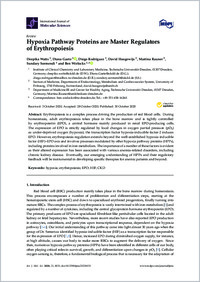Hypoxia pathway proteins are master regulators of erythropoiesis
- Watts, Deepika Institute of Clinical Chemistry and Laboratory Medicine, Technische Universität Dresden, 01307 Dresden, Germany
- Gaete, Diana Institute of Clinical Chemistry and Laboratory Medicine, Technische Universität Dresden, 01307 Dresden, Germany
- Rodriguez, Diego Institute of Clinical Chemistry and Laboratory Medicine, Technische Universität Dresden, 01307 Dresden, Germany
- Hoogewijs, David Section of Medicine, Department of Endocrinology, Metabolism and Cardiovascular System, University of Fribourg, 1700 Fribourg, Switzerland
- Rauner, Martina Department of Medicine III and Center for Healthy Aging, Technische Universität Dresden, 01307 Dresden, Germany
- Sormendi, Sundary Institute of Clinical Chemistry and Laboratory Medicine, Technische Universität Dresden, 01307 Dresden, Germany
- Wielockx, Ben Institute of Clinical Chemistry and Laboratory Medicine, Technische Universität Dresden, 01307 Dresden, Germany
-
30.10.2020
Published in:
- International Journal of Molecular Sciences. - 2020, vol. 21, no. 21, p. 8131
English
Erythropoiesis is a complex process driving the production of red blood cells. During homeostasis, adult erythropoiesis takes place in the bone marrow and is tightly controlled by erythropoietin (EPO), a central hormone mainly produced in renal EPO- producing cells. The expression of EPO is strictly regulated by local changes in oxygen partial pressure (pO2) as under-deprived oxygen (hypoxia); the transcription factor hypoxia-inducible factor-2 induces EPO. However, erythropoiesis regulation extends beyond the well-established hypoxia-inducible factor (HIF)–EPO axis and involves processes modulated by other hypoxia pathway proteins (HPPs), including proteins involved in iron metabolism. The importance of a number of these factors is evident as their altered expression has been associated with various anemia-related disorders, including chronic kidney disease. Eventually, our emerging understanding of HPPs and their regulatory feedback will be instrumental in developing specific therapies for anemic patients and beyond.
- Faculty
- Faculté des sciences et de médecine
- Department
- Département de Médecine
- Language
-
- English
- Classification
- Biological sciences
- License
- License undefined
- Identifiers
-
- RERO DOC 329766
- DOI 10.3390/ijms21218131
- Persistent URL
- https://folia.unifr.ch/unifr/documents/309239
Statistics
Document views: 97
File downloads:
- hoo_hpp.pdf: 190
